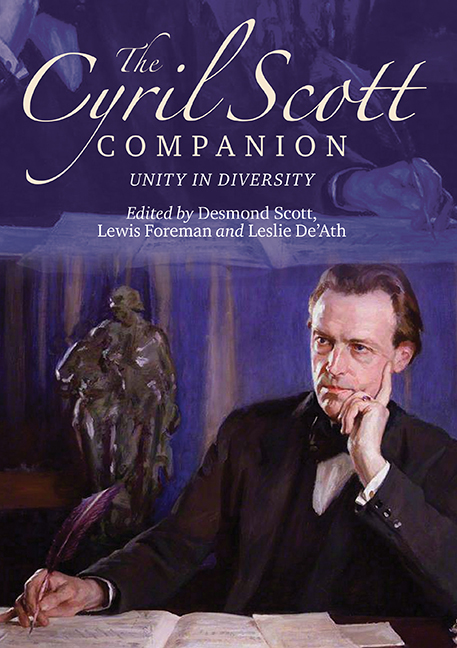Book contents
- Frontmatter
- Dedication
- Contents
- List of Illustrations
- List of Tables
- List of Contributors
- Foreword
- Preface
- Acknowledgements
- Editors' Note
- I SCOTT IN CONTEXT
- 1 From Frankfurt with Love: Friendships Observed through Correspondence and Reminiscence
- 2 Cyril Scott, Debussy and Stravinsky
- 3 Cyril Scott and the BBC
- 4 A Contemporary Composer's View of Cyril Scott's Music: ‘The Subtle Composer of the Prize-Winning Overture’
- 5 ‘Music for the Martians’: Scott's Reception and Reputation at Home and Abroad
- 6 Rose Allatini: Theme and Variations
- 7 Memories of the Man I Barely Knew
- II THE MUSIC
- III THE WRITINGS
- IV PERSONAL REMINISCENCES
- APPENDICES
- CATALOGUES, DISCOGRAPHY AND BIBLIOGRAPHY
- Index of Works
- General Index
5 - ‘Music for the Martians’: Scott's Reception and Reputation at Home and Abroad
from I - SCOTT IN CONTEXT
Published online by Cambridge University Press: 14 September 2019
- Frontmatter
- Dedication
- Contents
- List of Illustrations
- List of Tables
- List of Contributors
- Foreword
- Preface
- Acknowledgements
- Editors' Note
- I SCOTT IN CONTEXT
- 1 From Frankfurt with Love: Friendships Observed through Correspondence and Reminiscence
- 2 Cyril Scott, Debussy and Stravinsky
- 3 Cyril Scott and the BBC
- 4 A Contemporary Composer's View of Cyril Scott's Music: ‘The Subtle Composer of the Prize-Winning Overture’
- 5 ‘Music for the Martians’: Scott's Reception and Reputation at Home and Abroad
- 6 Rose Allatini: Theme and Variations
- 7 Memories of the Man I Barely Knew
- II THE MUSIC
- III THE WRITINGS
- IV PERSONAL REMINISCENCES
- APPENDICES
- CATALOGUES, DISCOGRAPHY AND BIBLIOGRAPHY
- Index of Works
- General Index
Summary
The more philosophical composer adopts an attitude rather of pleasure than contempt when his works are condemned, because he realises there is a certain grave disappointment in being immediately understood; in knowing that a work of art, which has taken him months of thoughtful labour to accomplish, should be comprehended in a few moments by a man who is probably incapable of writing a note of music himself.
ALTHOUGH Scott later dismissed these comments – along with the rest of his attack on music critics which appeared in his book The Philosophy of Modernism (1917) – as a ‘youthful indiscretion’, his relationship with the press remained predominantly one of mutual hostility for the rest of his life. Apart from a very brief period near the start of the twentieth century when he was hailed as one of the ‘coming men’ of British music, Scott endured a lifetime of largely negative criticism. By surveying the reception of his music in the press, we can see how critical attitudes towards him developed both during and after his lifetime. This chapter shows how early views of Scott as a promising but immature composer were followed by his rise to fame in 1903 and then by his acquiring a reputation as Britain's foremost ‘ultra-modern’ composer. Scott's reception in America and on the Continent is also considered, before tracing the fading of his stardom in the 1930s, his obscurity after World War 2, and ultimately the revival of interest that has taken place since the new millennium.
The earliest public performances of Scott's works took place in Germany: his First Symphony was performed in Darmstadt in January 1900, and his overture to Pelleas and Melisanda was heard in Frankfurt two months later. The mixed reaction that greeted the symphony was, in some respects, a sign of things to come. Scott later recalled of the occasion that ‘half the audience applauded and half hissed’, and while two of the German newspapers ‘loaded [his] work with abuse’, another ‘praised it out of all proportion to its merits’, describing Scott as England's ‘musical Messiah’. One critic particularly disliked the ‘illogical peculiarities’ of the fourth movement, which he felt betrayed ‘a very distinctive, but underdeveloped artistic taste’.
- Type
- Chapter
- Information
- The Cyril Scott CompanionUnity in Diversity, pp. 69 - 88Publisher: Boydell & BrewerPrint publication year: 2018



